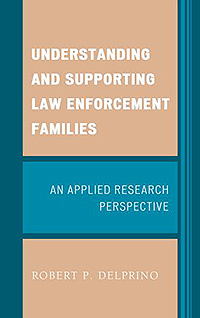
Most people experience stress related to their work, their home lives, and the effort to find the balance between them. However, a career as a police officer adds significantly to that stress in unique ways.
 Robert Delprino, professor of psychology and assistant dean of the School of Natural and Social Sciences, has spent much of his career studying ways to support corrections officers, first responders, and police officers. Delprino's book Understanding and Supporting Law Enforcement Families: An Applied Research Perspective presents research-based best practices in supporting police officers.
Robert Delprino, professor of psychology and assistant dean of the School of Natural and Social Sciences, has spent much of his career studying ways to support corrections officers, first responders, and police officers. Delprino's book Understanding and Supporting Law Enforcement Families: An Applied Research Perspective presents research-based best practices in supporting police officers.
“We’ve known how to assist cops for a long time,” said Delprino, “but we haven't done enough with that knowledge.” Understanding and Supporting Law Enforcement Families is meant for psychologists and students. The book summarizes the findings of the research that enables police officers to manage stress and attain a work-life balance.
Early in his career, Delprino was torn between studying law enforcement and psychology. Through organizational psychology, he found a way to integrate both fields. He also discovered the organization of law enforcement and its culture are an obstacle to providing support to police officers. For example, the police department hierarchy often advises officers to separate work and home life. “But leaving work at work is almost impossible for cops,” he said. “Adding to that is officers’ desire to protect their families from worry.”
Involve the Families
Beginning with his work at the United States Department of Justice in the 1990s, Delprino realized that most officer-support programs focused on officers and omitted their families. However, his work has demonstrated that it is essential to involve officers’ families in identifying, developing, and delivering useful programs.
“Family members may not carry a gun or a badge, but they’re still influenced by the job,” he said. “When a person becomes an officer, the whole family takes on the career.” He’s talked to children who worry about their parents coming home, and to spouses who not only cope with officers’ stress but with their own often-hidden worry.
Compounding the problem is the difference between the skills practiced by police officers in their daily work and the skills required in a family environment. For example, police work demands that officers take control of situations and hide their emotions. “But these skills don’t work well in their own family lives,” said Delprino.
In the course of a day’s work, an officer may experience a stress response—fight or flight—many times, which takes a physical toll as well as a psychological toll. “Often that response hasn’t dissipated by the end of a shift,” said Delprino. Other stressors include shiftwork, changing procedures, public expectations, and the cumulative effect of dealing with humanity’s darker side over years and decades.
Specialized Expertise Necessary
It’s also essential that any programs be developed by psychologists who specialize in law-enforcement support, according to Delprino. “Sometimes the relationship between psychologists and cops is strained,” he said. “Officers are evaluated before they’re hired and throughout their career. Their jobs sometimes depend on those evaluations, so it’s important to recognize that police psychology is a specialized field and that practitioners need to understand it.”
It’s not just police officers and their families who benefit from appropriate assistance. Delprino said, “It’s in society’s best interest to provide psychological and emotional support to the people who are charged with maintaining order and preserving lives and property.”
